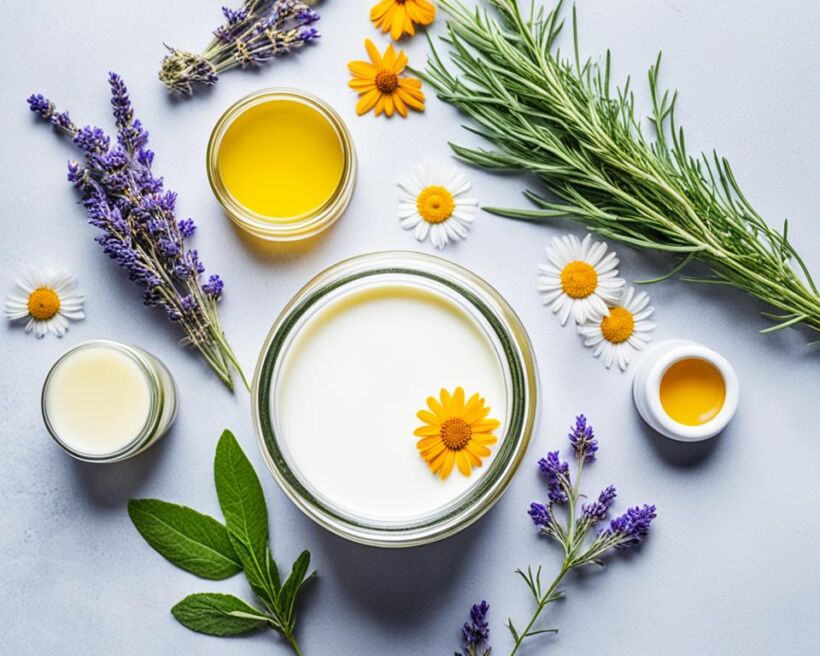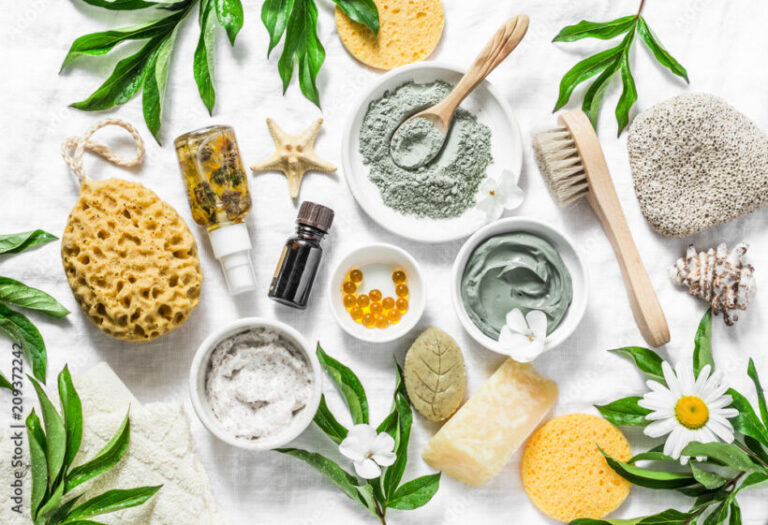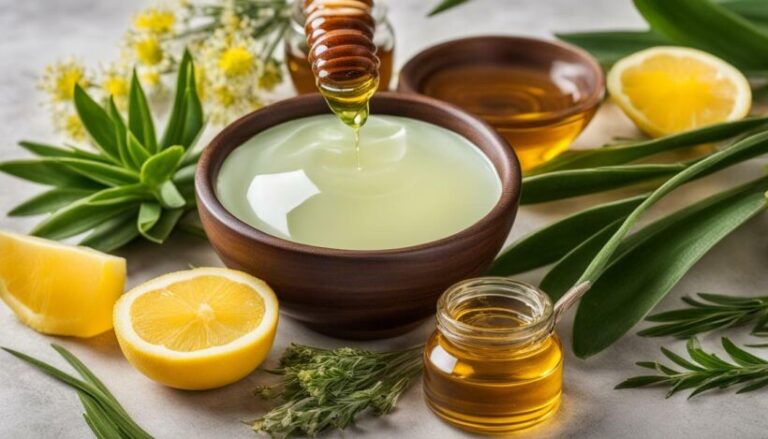Do you suffer from the discomfort of eczema and sensitive skin? If so, you’re not alone. Millions of people around the world grapple with the challenges of managing these conditions on a daily basis. The relentless itchiness, dryness, and inflammation can often feel overwhelming, impacting your quality of life and self-confidence.
But fear not! There is hope and relief in the form of natural remedies. In this comprehensive guide, we will explore a variety of holistic solutions that can help alleviate the symptoms of eczema and sensitive skin. From gentle moisturizers to herbal remedies, we’ve got you covered.
Join us as we embark on a journey to discover the best natural remedies for your skin. Say goodbye to harsh chemicals and hello to soothing botanicals that will nourish and heal. With our expert advice and practical tips, you can find comfort and regain control over your skin health.
Understanding Eczema and Sensitive Skin
Before delving into natural remedies, it’s important to have a clear understanding of eczema and sensitive skin. These conditions can cause discomfort and require special care. Let’s take a closer look at what they are, their causes, and common triggers that can worsen symptoms.
Eczema: A Brief Overview
Eczema, also known as atopic dermatitis, is a chronic skin condition characterized by dry and itchy patches. It often appears on the face, hands, elbows, and knees. Eczema can affect people of all ages, but it’s particularly common in children.
The exact cause of eczema is not fully understood, but it is believed to be a combination of genetic and environmental factors. Individuals with a family history of eczema, asthma, or allergies are more likely to develop the condition.
Sensitive Skin: What Does It Mean?
Sensitive skin refers to skin that is easily irritated and reacts to various substances or environmental factors. People with sensitive skin may experience redness, itching, and discomfort after using certain skincare products or being exposed to specific triggers like harsh weather conditions or allergens.
Common triggers for sensitive skin include fragrances, dyes, certain fabrics, and excessive heat or cold. It’s essential to identify and avoid these triggers to prevent flare-ups and maintain skin health.
Identifying Triggers and Managing Symptoms
To effectively manage eczema and sensitive skin, it’s crucial to identify triggers and adopt appropriate skincare practices. This may include:
- Avoiding harsh soaps and cleansers that can strip the skin of moisture
- Opting for fragrance-free and dye-free skincare products
- Using gentle, non-abrasive fabrics
- Moisturizing regularly to keep the skin hydrated
- Protecting the skin from extreme temperatures
By understanding the unique characteristics of eczema and sensitive skin, you can take proactive steps to manage and improve your skin health.
Moisturize and Hydrate Your Skin
Proper hydration is crucial for managing eczema and sensitive skin. By incorporating natural moisturizers into your skincare routine, you can help prevent dryness and reduce inflammation. Here are some of the best natural remedies for sensitive and dry skin:
- Coconut oil: This versatile oil is known for its hydrating properties. It penetrates the skin deeply, locks in moisture, and forms a protective barrier against irritants.
- Shea butter: Rich in fatty acids and vitamins, shea butter nourishes and moisturizes the skin. Its emollient properties help soothe dryness and restore the skin’s natural moisture balance.
- Aloe vera gel: Aloe vera has cooling and hydrating properties. It helps soothe irritated skin, reduces inflammation, and promotes healing.
- Oatmeal: Oatmeal has long been used for its therapeutic properties. It moisturizes the skin, relieves itching, and forms a protective barrier on the skin’s surface.
Additionally, it’s important to adopt certain habits that promote hydration and prevent moisture loss. Consider the following tips:
- Drink plenty of water throughout the day to keep your body hydrated from the inside out.
- Avoid hot showers or baths, as they can strip the skin of natural oils. Opt for lukewarm water instead.
- Pat your skin dry gently after washing, leaving some moisture on the skin’s surface.
- Apply moisturizer immediately after bathing to lock in moisture.

Remember, everyone’s skin is unique, so it may take some trial and error to find the best natural remedy for your sensitive skin. Pay attention to how your skin reacts to different products and adjust your skincare routine accordingly. With proper hydration and the right natural remedies, you can soothe your sensitive skin and promote a healthier complexion.
Soothing Bathing Techniques
When it comes to managing eczema, soothing bath time rituals can offer much-needed relief for your sensitive skin. By incorporating gentle bathing techniques along with natural additives, you can calm inflammation and relieve itching effectively.
Temperature Matters
To begin, ensure that the water temperature is lukewarm rather than hot. Hot water can aggravate eczema symptoms and cause further irritation. A comfortably warm bath will help to soothe your skin without stripping away its natural oils.
Natural Additives
Additives can enhance the healing properties of your bathwater. Consider incorporating natural remedies such as colloidal oatmeal, baking soda, or Epsom salts. These substances have anti-inflammatory properties that can alleviate itching and reduce redness.
Colloidal oatmeal, in particular, forms a soothing barrier on the skin, locking in moisture and relieving dryness. It also helps to prevent further damage to the skin’s protective barrier.
Baking soda, on the other hand, has a calming effect on inflamed skin, neutralizing pH levels and reducing itchiness. Epsom salts are known for their ability to promote relaxation, reduce inflammation, and detoxify the skin.
| Additive | Benefits |
|---|---|
| Colloidal Oatmeal | Forms a soothing barrier, locks in moisture, and relieves dryness |
| Baking Soda | Calms inflammation, neutralizes pH levels, and reduces itchiness |
| Epsom Salts | Promotes relaxation, reduces inflammation, and detoxifies the skin |
Gentle Cleansers
When selecting a cleanser for your bath, opt for mild, fragrance-free options that are specifically formulated for sensitive skin. Harsh soaps and detergents can strip away natural oils and exacerbate eczema symptoms.
Pat Dry and Moisturize
After your bath, use a soft towel to gently pat your skin dry instead of rubbing, as rubbing can cause further irritation and friction. Immediately follow with a rich moisturizer to lock in the moisture and create a protective barrier on your skin.
Now that you have learned about the soothing bathing techniques for eczema-prone skin, it’s time to indulge in some self-care and find the relief you deserve.
Herbal Remedies and Essential Oils
Certain herbs and essential oils offer natural remedies for eczema and holistic solutions for sensitive skin. These alternative treatments have shown promising results in managing eczema symptoms, providing relief from itchiness, inflammation, and dryness. Understanding the benefits, usage guidelines, and potential side effects of these remedies can help you incorporate them effectively into your skincare routine.
Herbs such as chamomile, calendula, and aloe vera have soothing and anti-inflammatory properties that can calm eczema flare-ups. You can prepare herbal infusions or use topical creams containing these herbal extracts. (1, 2)
Eucalyptus, lavender, and tea tree essential oils are also popular choices for managing eczema. These oils have antimicrobial properties and can help reduce itching and redness. However, it’s important to note that essential oils should always be diluted before application to avoid skin irritation. (3, 4)
It is crucial to remember that while these herbal remedies and essential oils can provide relief for eczema, they may not be suitable for everyone. Always perform a patch test before using any new product and consult with a healthcare professional, especially if you have any pre-existing conditions or allergies.
The Benefits of Herbal Remedies and Essential Oils
Choosing natural remedies for eczema and sensitive skin can offer the following benefits:
- Reduced inflammation and redness
- Soothing relief from itchiness
- Promotion of skin healing
- Improved hydration and moisture retention
Usage Guidelines for Herbal Remedies and Essential Oils
When using herbal remedies and essential oils for eczema and sensitive skin, it’s important to follow these guidelines:
- Perform a patch test: Apply a small amount of the herbal remedy or diluted essential oil to a small area of skin and wait 24 hours to check for any adverse reactions.
- Dilute essential oils: Essential oils are highly concentrated and should always be diluted in a carrier oil such as coconut oil or almond oil before application to the skin. The recommended dilution ratio is usually 2%-3%.
- Apply with caution: Gently massage the herbal remedy or essential oil onto affected areas, avoiding open wounds or broken skin.
- Discontinue use if irritation occurs: If you experience any redness, swelling, or increased itching, discontinue use and consult a healthcare professional.
Remember that natural remedies may take time to show results and may not work for everyone. It’s essential to be patient and consistent with your chosen remedy to achieve the best outcomes.
| Herbal Remedy | Benefits | Usage Guidelines |
|---|---|---|
| Chamomile | Soothing, anti-inflammatory properties | Prepare herbal infusions or use topical creams, perform a patch test, avoid if allergic to daisies |
| Calendula | Anti-inflammatory, promotes skin healing | Apply as creams, ointments, or herbal infusions, perform a patch test, avoid if allergic to marigold family |
| Aloe vera | Moisturizing, anti-inflammatory properties | Apply as a gel or extract, perform a patch test, choose pure and organic products without additives |
| Eucalyptus | Antimicrobial, reduces itching | Dilute in a carrier oil, avoid contact with eyes or sensitive areas, perform a patch test |
| Lavender | Calming, relieves inflammation and itchiness | Dilute in a carrier oil, perform a patch test, avoid if allergic to lavender |
| Tea tree | Antibacterial, anti-inflammatory | Dilute in a carrier oil, perform a patch test, avoid if allergic to tea tree oil |
Dietary Modifications for Skin Health
When it comes to managing eczema, what you eat can have a significant impact on the health of your skin. Making dietary modifications can help alleviate symptoms and promote overall skin health. By incorporating skin-friendly foods and eliminating potential triggers from your diet, you can support your body’s natural healing processes and reduce inflammation.
Here are some dietary changes that can be beneficial:
- Incorporate Skin-Friendly Foods: Certain foods have been found to be beneficial for eczema and sensitive skin. These include foods rich in omega-3 fatty acids (such as fatty fish, flaxseeds, and walnuts), antioxidants (such as fruits and vegetables), and probiotics (such as yogurt and kefir).
- Avoid Potential Triggers: Some foods can trigger flare-ups and worsen eczema symptoms. Common culprits include dairy products, gluten, soy, eggs, and nuts. Consider keeping a food diary to identify any potential triggers and eliminate them from your diet.
- Stay Hydrated: Drinking an adequate amount of water is essential for maintaining healthy skin. Proper hydration helps keep your skin moisturized from within, reducing dryness and itching.
Consulting with a healthcare professional or registered dietitian can be helpful in creating an individualized diet plan that suits your specific needs and addresses any nutrient deficiencies. They can guide you in making the right dietary choices for eczema and sensitive skin management.
Skin-Friendly Foods
| Foods | Description |
|---|---|
| Salmon | Packed with omega-3 fatty acids, which help reduce inflammation and maintain skin health. |
| Blueberries | Rich in antioxidants that protect the skin from damage caused by free radicals. |
| Spinach | Contains vitamins A and C, which promote skin repair and rejuvenation. |
| Yogurt | A probiotic-rich food that supports gut health, which is linked to skin health. |
| Quinoa | A gluten-free grain that provides essential nutrients for healthy skin. |
By making these dietary modifications, you can support your skin’s natural healing process and improve eczema and sensitive skin symptoms. Remember to consult with a healthcare professional before making any significant changes to your diet.

Lifestyle Tips for Managing Eczema
Beyond topical treatments, certain lifestyle modifications can make a significant difference in managing eczema and sensitive skin. By incorporating these effective natural remedies into your daily routine, you can experience relief and promote healthier skin.
Reduce Stress
Stress can worsen eczema symptoms, triggering flare-ups and increasing inflammation. Try incorporating stress-reducing activities into your daily routine, such as:
- Practicing meditation or deep breathing exercises
- Engaging in regular physical activity, such as yoga or walking
- Pursuing hobbies or activities that bring you joy and relaxation
Improve Sleep
Adequate sleep allows your body to heal and rejuvenate. Follow these tips for better quality sleep:
- Create a calming bedtime routine, including activities like reading or taking a warm bath
- Avoid stimulating activities and electronic devices before bed
- Ensure your sleep environment is comfortable, cool, and free from distractions
Maintain a Healthy Environment
Creating a healthy environment can help minimize eczema triggers and promote skin healing. Consider the following:
- Use hypoallergenic and fragrance-free products for cleaning and laundry
- Avoid exposure to harsh chemicals and irritants
- Keep your home well-ventilated to minimize humidity and mold growth
Remember to consult with a healthcare professional for personalized advice on managing eczema and sensitive skin. By implementing these lifestyle changes, you can complement the effects of natural remedies and work towards long-term relief.

Natural Remedies for Itchy Skin
If you’re experiencing itchy skin as a result of eczema, we’ve got you covered. Here, we’ll explore a range of natural remedies that can help alleviate itchiness and provide you with much-needed relief.
One effective natural remedy for itchy skin is the use of soothing creams. Look for creams that contain ingredients like aloe vera, chamomile, or calendula, as these have anti-inflammatory properties that can help soothe and calm irritated skin. Applying these creams to the affected areas can provide immediate relief.
Another natural remedy to consider is cold compresses. Simply soak a clean cloth in cold water, wring out any excess moisture, and apply it gently to the itchy areas. The cool temperature can help numb the sensation of itchiness and provide temporary relief.
Additionally, there are several other techniques you can try to alleviate itchiness. Some individuals find that taking an oatmeal bath can provide relief. You can create an oatmeal bath by grinding oats into a fine powder and adding it to your bathwater. Soaking in this mixture for about 15 minutes can help soothe the skin and reduce itchiness.
Remember: It’s crucial to ensure the water is lukewarm rather than hot, as hot water can further dry out the skin and worsen itchiness.
Comparison of Natural Remedies for Itchy Skin
| Natural Remedy | Benefits |
|---|---|
| Soothing Creams | Provides immediate relief by soothing and calming irritated skin |
| Cold Compresses | Numbs itchiness and offers temporary relief |
| Oatmeal Baths | Soothes the skin and reduces itchiness |
As with any natural remedy, it’s essential to listen to your body and observe how it reacts. If you notice any adverse effects or if your symptoms persist, it’s advisable to consult a healthcare professional for further guidance.
Now that you’re equipped with these natural remedies for itchy skin, you can find relief and restore comfort to your skin.
Managing Eczema in Children
Eczema can be a challenging condition, especially when it affects children. Their sensitive skin requires gentle care and natural remedies can offer a safe and effective approach. Here, we will provide specific considerations and recommendations for managing eczema in children.
1. Keep their skin moisturized: Moisturizing is crucial for managing eczema in children. Use gentle, fragrance-free moisturizers that are specifically formulated for sensitive skin. Apply them regularly, especially after bathing, to lock in moisture and prevent dryness.
2. Choose child-friendly bathing products: Opt for mild, hypoallergenic soaps and shampoos when bathing your child. Avoid hot water and rinse thoroughly to remove any residue that may irritate their skin. It is also helpful to limit bath time to prevent excessive dryness.
3. Dress your child in soft, breathable fabrics: Clothing made from natural fibers like cotton or bamboo can help prevent irritation and promote airflow. Avoid harsh fabrics like wool or synthetic materials, which can aggravate eczema-prone skin.
“Using mild, fragrance-free moisturizers and gentle bathing products, as well as dressing your child in soft, breathable fabrics, can help alleviate eczema symptoms.”
4. Avoid potential triggers: Identify any potential triggers that may worsen your child’s eczema. Common triggers include certain foods, pollen, pet dander, and harsh chemicals. By eliminating or minimizing exposure to these triggers, you can help reduce flare-ups and manage their eczema more effectively.
| Potential Triggers | Recommended Actions |
|---|---|
| Foods (e.g., dairy, eggs, peanuts) | Consult with a pediatrician or allergist for appropriate dietary modifications. |
| Allergens (e.g., pollen, pet dander) | Keep your child’s environment clean and free from potential allergens. Consider using air purifiers or hypoallergenic bedding. |
| Harsh chemicals (e.g., detergents, cleaning products) | Switch to hypoallergenic, fragrance-free alternatives for cleaning and laundry purposes. |
“Identifying and minimizing exposure to triggers such as certain foods, allergens, and harsh chemicals can help manage eczema in children.”
5. Consult a healthcare professional: It’s essential to involve a healthcare professional in your child’s eczema management. They can provide personalized advice, prescribe appropriate treatments if necessary, and monitor your child’s progress. Remember, each child’s eczema is unique, and a tailored approach is vital for their well-being.
By implementing these strategies and using natural remedies, you can help alleviate your child’s eczema symptoms and provide them with the care they need. However, always consult with a healthcare professional before starting any new treatment or if you have concerns about your child’s condition. With the right approach, eczema can be effectively managed, supporting your child’s overall skin health and well-being.
Conclusion
In conclusion, this Guide to Natural Remedies for Eczema and Sensitive Skin has provided a comprehensive exploration of holistic approaches for finding relief and promoting healthier skin. By incorporating these natural remedies into your daily skincare routine, you can effectively manage eczema and sensitive skin without relying solely on conventional treatments.
Through the use of moisturizers and hydration techniques, you can prevent dryness and inflammation, while soothing bathing techniques can calm itching and reduce inflammation. Herbal remedies and essential oils have shown promising results in managing eczema symptoms, and dietary modifications, such as eliminating potential triggers and incorporating skin-friendly foods, can contribute to overall skin health.
Additionally, adopting certain lifestyle tips, like reducing stress and improving sleep, can further support eczema management. It is important to remember that each individual’s experience with eczema is unique, and consulting with a healthcare professional can provide personalized advice and guidance tailored to your specific needs.
With the knowledge gained from this guide, you are empowered to take control of your eczema and sensitive skin through natural remedies. Prioritize self-care, experiment with different remedies, and embrace a holistic approach to skincare for long-term relief and healthier skin.







